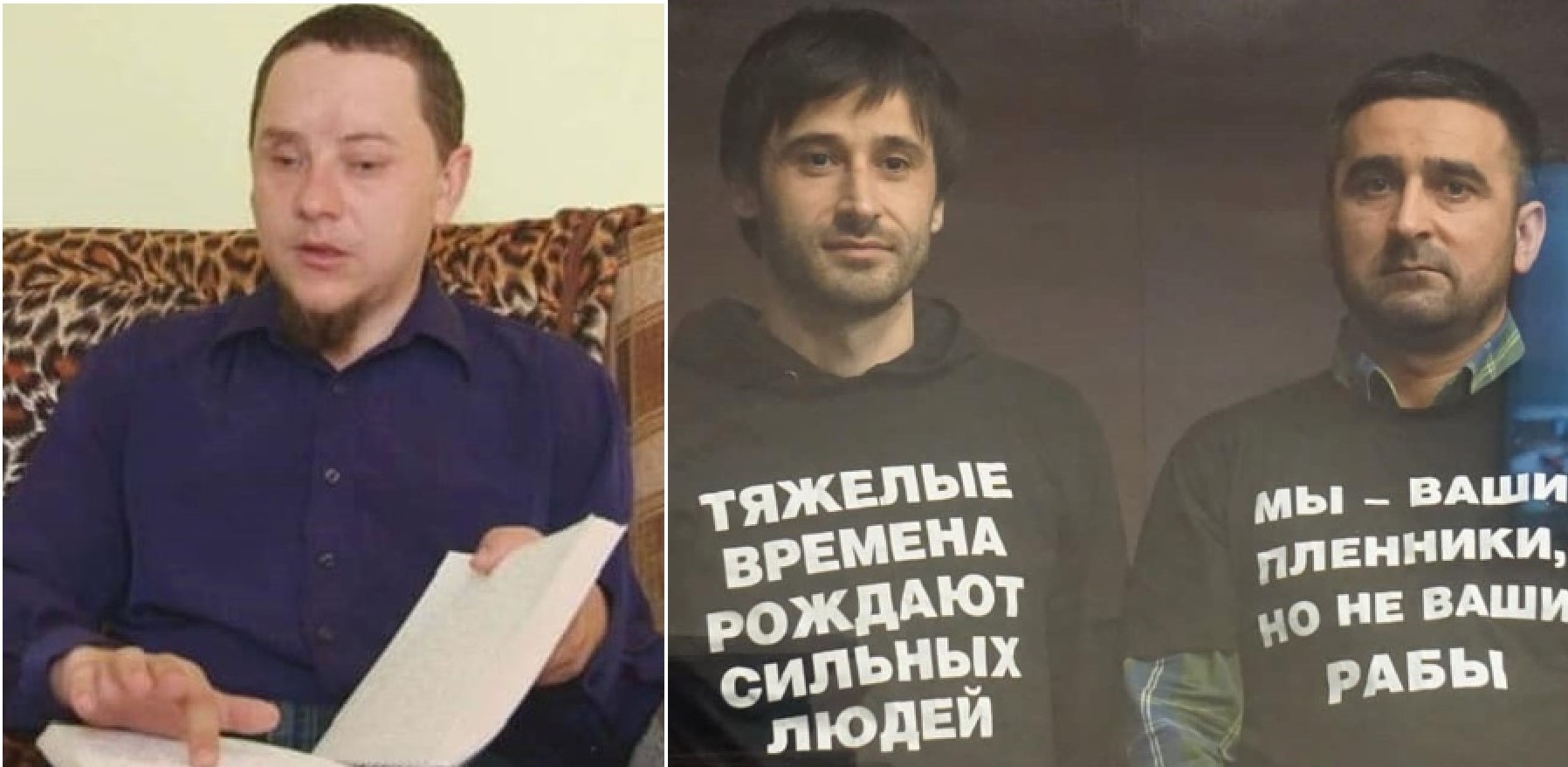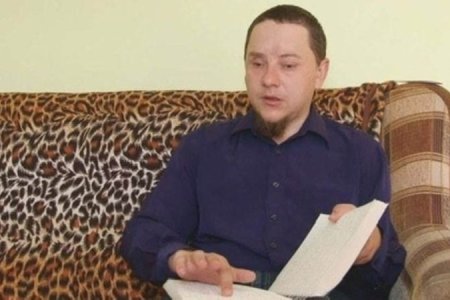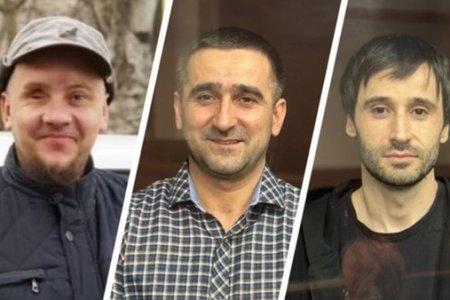
A Russian court has passed huge sentences against three Crimean Muslims on essentially ‘thought crime’ charges, with the longest sentence against a man who is blind and could not have read the books which the FSB planted in his home as ‘evidence’. The 17-year sentence against Oleksandr Sizikov and 12-year sentences against two Crimean Tatars Seiran Khairedinov and Alim Sufianov are all significantly higher than the 6-year sentence recently handed down in occupied Crimea for murder and have been passed against law-abiding citizens who were not accused of any recognizable crime.
Oleksandr Sizikov, Sergei Khairedinov and Alim Sufianov were among seven Crimeans arrested after armed ‘searches’ on 7 July 2020. The men were all charged under Russia’s ‘terrorism’ legislation, although they were accused essentially only of having beliefs that Russia has outlawed. Without any actual evidence, the FSB claim that the men were involved in the peaceful transnational Hizb ut-Tahrir Muslim organization which is legal in Ukraine. Russia’s Supreme Court declared Hizb ut-Tahrir ‘terrorist’ in 2003, with its unexplained ruling passed in secret and only made public after it was too late for the organization itself, and human rights groups, to challenge it. The Russian FSB began arresting Ukrainian citizens, the vast majority of them Crimean Tatar, on these charges in 2015, and has been using them as a weapon against civic journalists and activists, especially those involved in the Crimean Solidarity human rights movement. ‘Guilty’ verdicts and long sentences are essentially guaranteed, with ‘judges’ from the Southern District Military Court in Rostov notorious for their active cooperation with the prosecution and total disregard for proven violations.
In all such ‘trials’, the FSB needs at least one person to face the more serious charge of ‘organizing’ a supposed Hizb ut-Tahrir group (Article 205.5 § 1 of Russia’s criminal code). The others are charged with ‘involvement’ in this alleged group (under Article 205.5 § 2). The only real difference seems to be in sentence, with those charged with Article 205.5 § 1 being imprisoned for 17 years or more.
The present ‘case’ had already caused shockwaves because the Russians had come for Sizikov, who has been blind and partially disabled since an accident in 2009 when he was hit by a car while cycling. The shock intensified when it transpired that the FSB had designated Sizikov as ‘organizer’ of a supposed Hizb ut-Tahrir group, and was claiming that Khairedinov and Sufianov were involved in this ‘group’. Sizikov was claimed to have been the organizer of a group which purportedly “carried out covert anti-constitutional activities through exerting influence on people’s religious feelings; organized and carried out meetings of the group, so-called ‘khalakaty’; looked for new participants and circulated the ideas”.
Until recently, there had seemed some small hope that a Russian court would not violate Russian legislation which does not allow for the imprisonment of people with certain conditions, these including Sizikov’s level of disability. He has, up till now, been under full house arrest, unlike Khairedinov and Sufianov who were placed in detention immediately. The Russian prosecutor Sergei Aidinov had attempted on several occasions to get Sizikov placed in detention, with presiding judge Kirill Krivtsov always rejecting the applications.
It became clear earlier in 2023 that Russian courts are willing to flout such legislation and pass effective death sentences against Crimean Tatar and other Ukrainian political prisoners with two men (Dzhemil Gafarov and Kostiantyn Shyrinh) already killed, and civic journalist Amet Suleimanov’s life in immediately and critical danger.
In January 2021, prosecutor Sergei Aidinov demanded an 18-year real sentence against Oleksandr Sizikov, and 14-year sentences against Seiran Khairedinov and Alim Sufianov.
Although one of the reasons for hearings at the Southern District Military Court being adjourned had been Sizikov’s health issues, on 17 May 2023, ‘judges’ Kirill Krivtsov, together with Alexei Magomadov and Sergei Yarosh found all three men ‘guilty’ both of the charges under Article 205.5 and of the additional and entirely surreal charge under Article 278 (planning to violently seize power - !).
Sizikov was sentenced to 17 years harsh-regime imprisonment, with the first four years in a prison, the absolute worst of all Russian penal institutions. The ‘court’ also added a further 18 months restricted liberty sentence at the end of the term of imprisonment. Khairedinov and Sufianov were each sentenced to 12 years of harsh regime imprisonment, also with the first four years in a prison. In their cases, the term of restricted liberty after the main sentence is one year.
Sufianov appeared in court in a T-shirt with the words ‘Hard times give birth to strong people’, Khairedinov’s T-shirt read: “We are your prisoners, but not your slaves” Sizikov remains for the moment in occupied Crimea, with the real sentence to be applied if the appeals are rejected. The men’s families, friends and civic activists were present in Rostov to show their support.
All of the FSB officers, prosecutors and judges involved in these prosecutions are well-aware that they are serving to imprison men with families, who have committed no crime. The details below are only some of the reasons why all of them should be placed under international sanctions.
Absurd charges.
There is no evidence that Hizb ut-Tahrir has committed acts of terrorism anywhere in the world. There are also very strong grounds for suspecting that the 2003 Russian Supreme Court ruling was politically motivated and aimed at helping the Russian authorities illegally deport Uzbek refugees trying to escape religious persecution in Uzbekistan.
Fabricated ‘evidence’
The families of Khairedinov and Sufianov stated from the outset that the armed and masked men who burst into their homes on 7 July 2020, and prevented lawyers being present during their ‘searches’, had planted ‘prohibited books’. It later became clear that they had done so in Sizikov’s case as well, although they left books that he was physically unable to read.
FSB-loyal ‘experts’ who are basically willing to say that illicitly taped conversations somehow ‘prove’ that the men were involved in Hizb ut-Tahrir
Fake secret witnesses
Prosecutor Aidinov claimed that Sizikov’s laptop contained programs which he was able to use through the use of his voice. In fact, Sizikov could only use them when helped by others. He has stated that he was ‘helped’ in using the laptop by Konstantin Tumarevich. This individual is believed to have acted as so-called ‘secret’ or ‘anonymous witness’ in Russia’s prosecution of a huge number of Crimean Tatar or other Ukrainian Muslim political prisoners from Bakhchysarai. Tumarevich is a fugitive from justice in his native Latvia, and his vulnerable legal position in occupied Crimea and lack of documents provided the FSB with clear leverage against him. He has thus far been used to provide ‘anonymous witness’ testimony against at least 20 recognized political prisoners. In each such ‘trial’, the ‘judges’ ignore the fact that there are no grounds for secrecy, and every reason to conclude that it is the FSB Tumarevich would need to fear, if he refused to collaborate, not the political prisoners or their families. In general, the presiding ‘judge’ in these cases blocks questions from the defence which demonstrate that the so-called ‘witness’ is lying.
In this ‘trial’, as in many others, the charges and FSB surveillance date back to 2015 when Tumarevich was actively and freely using Sizikov’s computer, and when Sizikov had no way of monitoring what the Latvian was doing
Oleksandr Sizikov (b. 1984) converted to Islam in 2006, when he was 22. Despite his severe disabilities, Sizikov held two solitary pickets (in April 2019 and May 2020) calling for the release of political prisoners and for an end to the repression against Crimean Muslims. Well-known lawyer Emil Kurbedinov suggested in October 2020 that his arrest was the FSB’s revenge for many occasions when Sizikov had expressed his outrage at the armed searches they were carrying out and the political trials underway. “There is no other way to explain the persecution of a totally blind person who has not committed any crime”.
Alim Sufianov (b. 1990) also played an active role in showing solidarity with political prisoners and helping their families. He had only recently married.
Seiran Khairedinov (b. 1988) was active in his community and, like Sufianov, who is a talented musician, took part in organizing festivals for children. He and his wife have three children: Emil; Elvina and Yasmina, who was just over a year old when her father was arrested.
Please write to Alim Sufianov and Seiran Khairedinov who are imprisoned in Russia!
The letters tell them and the authorities in Moscow that they are not forgotten. Letters need to be in Russian, and on ‘safe’ subjects. If that is a problem, use the sample letter below (copying it by hand), perhaps adding a picture or photo. Do add a return address so that the men can answer. The addresses can be written in either Russian or in English transcription. The particular addressee’s name and year of birth need to be given.
Sample letter
Привет,
Желаю Вам здоровья, мужества и терпения, надеюсь на скорое освобождение. Простите, что мало пишу – мне трудно писать по-русски, но мы все о Вас помним.
[Hi. I wish you good health, courage and patience and hope that you will soon be released. I’m sorry that this letter is short, it's hard for me to write in Russian, but you are not forgotten.]
Seiran Khairedinov
344022, Россия, Ростов-на-Дону, ул. Максима Горького, 219 СИЗО-1.
Хайрединову, Сейрану Нуриевичу
[In English: 344022 Russian Federation, Rostov on the Don, 219 Maxim Gorky St, SIZO-1
Khairedinov, Seiran Nurievich, b. 1986 ]
Alim Sufianov
344022, Россия, Ростов-на-Дону, ул. Максима Горького, 219 СИЗО-1.
Суфьянову, Алиму Нуритдиновичу
[In English: 344022 Russian Federation, Rostov on the Don, 219 Maxim Gorky St, SIZO-1
Sufianov, Alim Nuritdinovich, b. 1990 ]


